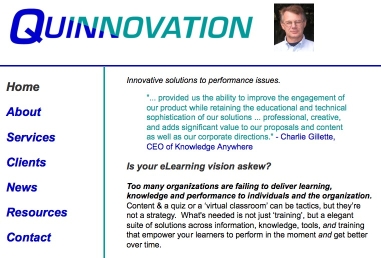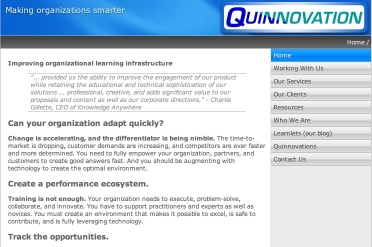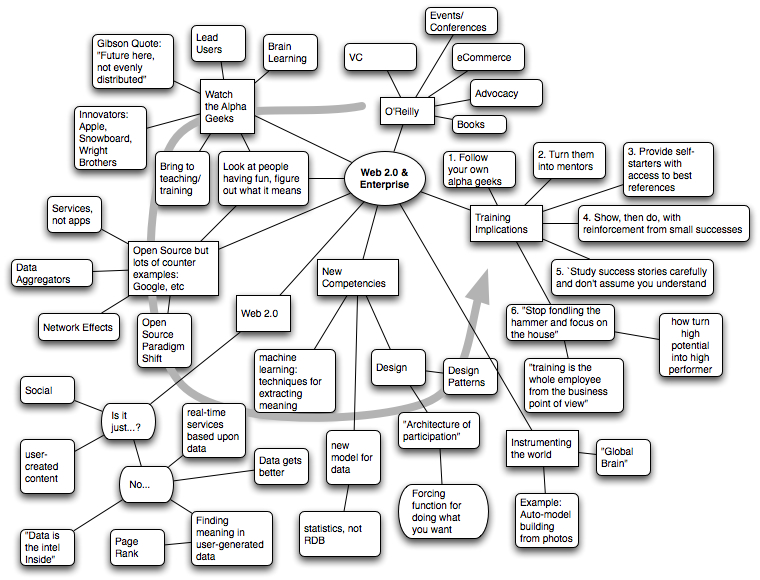I guess I have a visceral aversion to hype, because my initial reaction to ‘buzz’ is focusing in on the core affordances and disparaging mistaken uses of a new technology. However, I do eventually open to taking advantage of the affordances in new ways. Case in point: learning styles. I pointed out the flaws in the thinking several times, and then rethought them (without removing my previous views, I looked for the positive opportunities). Now, preparing for a presentation, I’m rethinking some of my stances on learning in virtual worlds.
I’ve previously opined that there are two key affordances in virtual worlds: the spatial and the social, and that the technical overheads mean that unless there’s a long term relationship, the associated costs really argue that you should be hitting both. I’m not changing that, but I was wondering what we might do if we did try to leverage those key affordances deliberately to support learning.
Taking a slightly cheeky approach, and quite willing to discredit presenting powerpoint presentations ‘in world’, I’ve tried to think through some subordinary, ordinary, and potentially extraordinary approaches to learning in a virtual world. That is, opening learners up both cognitively and emotionally, presenting concepts, having examples available, creating meaningful practice, and scaffolding reflection. What might we do?
Starting with pedagogy, I think a standard instructional design (read: presentations) is clearly subordinary. An ordinary pedagogy might be a problem-based approach, but a really extraordinary approach might be to create a full immersive storyline in which the problem is embedded, turning it into a game world: a World of LearnCraft. The idea is to mimic more closely the urgency typically felt when applying the knowledge in the real world (where it counts) by creating a similarly meaningful storyline to develop the associated motivation. Then embedding resources in the story would scaffold the learning. Of course, what I’m really talking about is game design ;).
Working with concepts, just presenting them is subordinary. Ordinary would be having them explorable, mapping them out in space, maybe with a scavenger hunt asking learners to find answers to questions embodied in the model. A truly extraordinary approach would be to have the learners co-create the concept representation, using the collaborative creation capability available at least in Second Life.
Just having a poster for an example seems subordinary. Having an example ‘gallery’, where you can examine the problem, the approach, and the results would be an ordinarily good approach. Ideally, the example could have the conceptual model layered on top of the decisions, mapping them to represent how th concept played out in context. Beyond that, however, having the example be truly exploratory, where you could make certain decisions and see how they play out, and being able to backtrack (particularly with annotation about the mistakes the original team made) would be really extraordinary.
Practice is where we can and should be looking to games. While having a quiz would be truly subordinary (if not maniacally mistaken), having a problem to solve ‘in world’ would be an ordinary approach. Again, having the problem be situated in a storyline, as the overall pedagogy, would be truly meaningful. It’s easiest if the task is inherently spatial and social, but we certainly can benefit from the immersion, and building in social learning components can lead to powerful outcomes.
I’m somewhat concerned about trying to make reflection ‘in world’, because it’s inherently an ‘immediate’ environment. It’s synchronous, and it’s been documented where normally reflective kids can go all ‘twitch’ in a digital environment. It may be that reflection is ‘best’ when kept out of the world. But for the sake of argument, let’s consider external reflection to be subordinary, and consider what might be ordinary and extraordinary. Surely, having an ‘in-world’ but ‘post-experience’ discussion would be the ordinary approach. Again, co-creating a representation of the underlying model guiding performance would be a really powerful reflective opportunity.
You still want to make some very basic learning decisions about virtual worlds. If you don’t have an inherent expectation that there’s a long-term relationship with the world, the technical and learning overheads to facility in using the world would clearly suggest that you should seriously ensure that the payoff is worth it (like if the learning outcome is inherently spatial and social) and otherwise consider alternatives. After that, you want to ensure that you’ve got meaningful practice. That’s your assessment component, and you do want them applying the knowledge. I suppose you could have the world be for concepts and examples, and have practice in some other format, but I admit I’m not sure why. Around the practice, figure out how to embed concept and example resources. Finally, seriously reflect on how you support reflection for your learners.
Serious learning can and does happen in virtual worlds, but to make it happen systematically is a matter of design, not just the platform. Fair enough?




